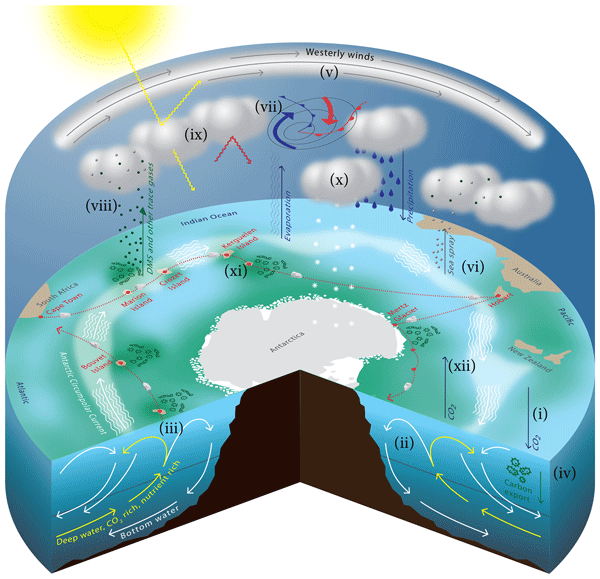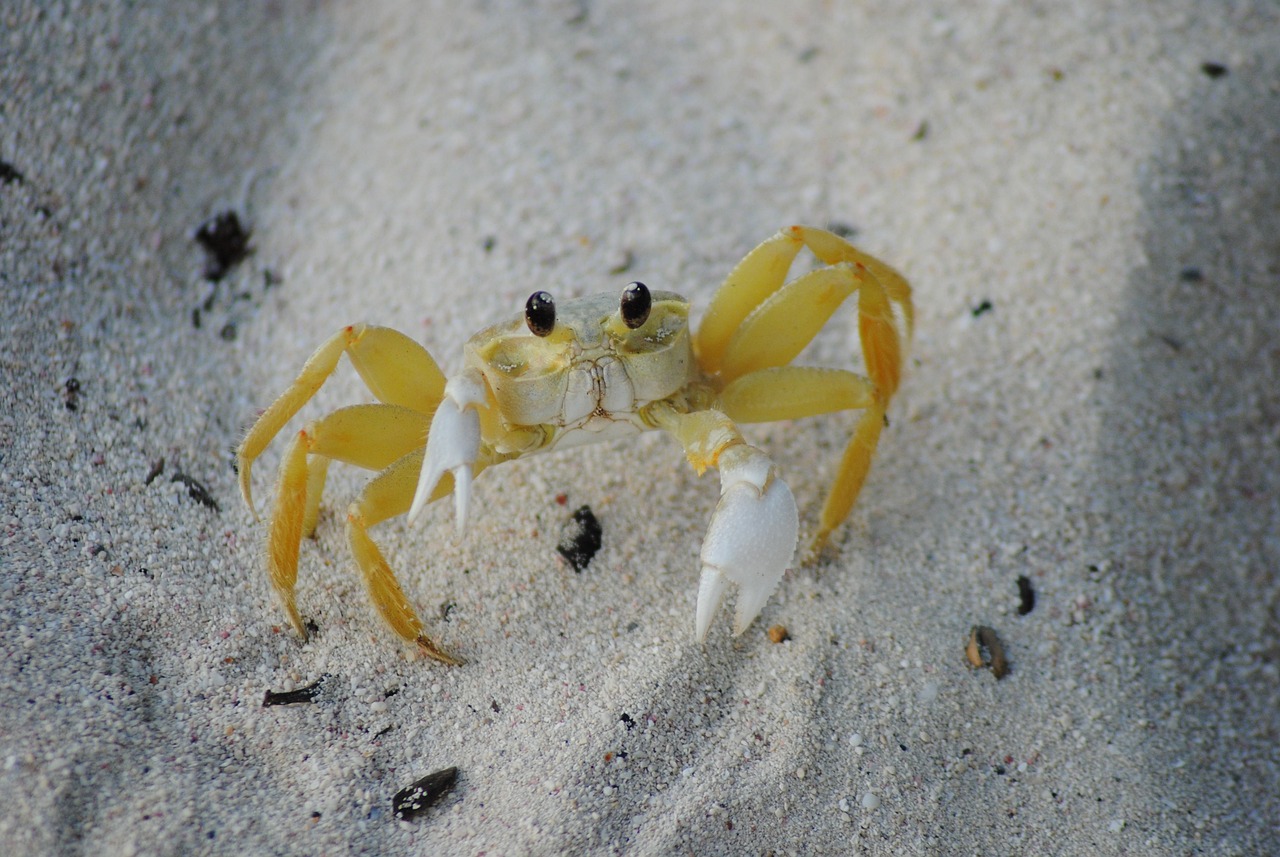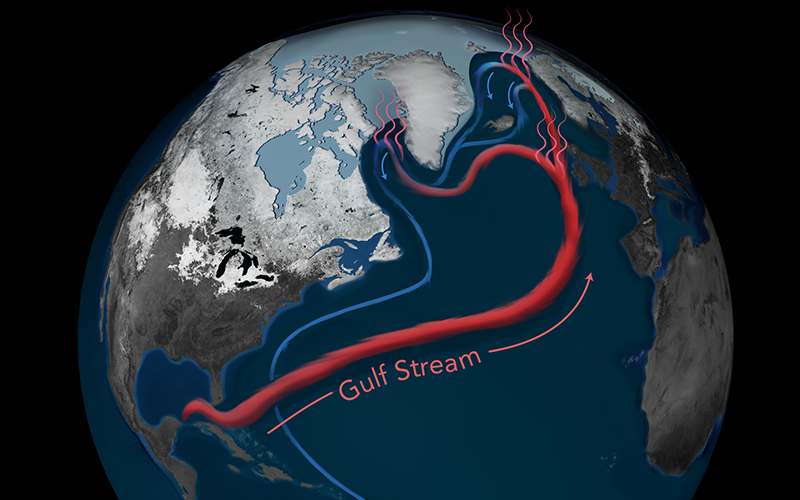Table of Contents
The Atlantic Ocean, often referred to simply as the Atlantic, stands as one of the Earth’s most iconic and awe-inspiring bodies of water. Spanning a colossal expanse between the Americas, Europe and Africa, it is the world’s second-largest ocean and a place of immense natural beauty and ecological significance. In this article, we embark on a journey to explore the majesty of the Atlantic Ocean, uncovering its vastness, rich marine life and the profound impact it has on our planet.
The Atlantic Ocean: Nature’s Grand Tapestry Unveiled
The Atlantic Ocean, an expanse that has captured the imagination of explorers, scientists and dreamers for centuries, is an awe-inspiring testament to the power and wonder of our planet. Stretching its colossal reach between the continents of the Americas, Europe and Africa, it is not just an ocean; it’s a living, breathing force of nature that plays a pivotal role in shaping the Earth’s landscapes and ecosystems. Join us on a voyage of discovery as we delve into the majesty of the Atlantic Ocean, revealing its vastness, teeming marine life and the profound influence it wields on our world.
1. Boundless Horizons: The Atlantic Ocean, often simply referred to as “the Atlantic,” is a realm of boundless horizons. Its vast expanse covers approximately 41 million square miles, making it the second-largest ocean on Earth. Its sheer size is staggering, dwarfing continents and countries and giving rise to an array of climates and ecosystems along its shores.
2. Marine Biodiversity: Beneath the waves of the Atlantic, an extraordinary world of marine biodiversity thrives. From the delicate coral reefs of the Caribbean to the robust kelp forests of the North Atlantic, this ocean houses a dazzling array of life. Whales, dolphins, sharks, sea turtles and countless fish species call the Atlantic home, making it a vital hub for marine conservation efforts.
3. Ocean Currents and Climate: The Atlantic Ocean’s oceanic currents are like the planet’s circulatory system, shaping the world’s climate patterns. The warm Gulf Stream, for instance, carries tropical heat from the Caribbean to the North Atlantic, influencing weather systems and ecosystems along its path. Understanding these currents is crucial for studying climate change and predicting weather events.
4. Historical Significance: The Atlantic Ocean has played a pivotal role in human history. It served as a conduit for exploration and trade during the Age of Discovery, connecting the Old World and the New World. Countless expeditions and voyages have crossed its waters, forever altering the course of human civilization.
5. Environmental Challenges: Like all oceans, the Atlantic faces environmental challenges, including pollution, overfishing and the impact of climate change. These issues threaten the delicate balance of its ecosystems and the livelihoods of communities along its coasts, highlighting the need for conservation and sustainable practices.
6. Natural Wonders: The Atlantic Ocean is home to a treasure trove of natural wonders, from the ethereal bioluminescence that lights up its depths to the breathtaking spectacle of migrating humpback whales. Its remote islands, such as the Azores, Canary Islands and Bermuda, offer havens for unique flora and fauna.
7. Cultural Diversity: The cultures and communities that border the Atlantic Ocean are as diverse as the waters themselves. From the vibrant rhythms of the Caribbean to the ancient traditions of coastal Europe and the bustling cities of the United States’ Eastern Seaboard, the Atlantic’s shores are a tapestry of human heritage and diversity.
8. Research and Exploration: Scientific exploration of the Atlantic continues to yield remarkable discoveries. Oceanographers, marine biologists and climate scientists are continually uncovering the ocean’s secrets, shedding light on its influence on global climate, ecosystems and biodiversity.
9. Conservation Efforts: The Atlantic Ocean is at the center of international conservation efforts. Initiatives to protect marine life, reduce plastic pollution and establish marine reserves aim to preserve the ocean’s vitality and ensure its long-term health for generations to come.
10. Source of Inspiration: Beyond its ecological, scientific and cultural significance, the Atlantic Ocean serves as a profound source of inspiration. Its vastness, mystery and ever-changing character have captivated artists, writers and adventurers, reminding us of the inexhaustible wonders of the natural world.
The Atlantic Ocean, with its grandeur and complexity, stands as a testament to the Earth’s awe-inspiring beauty and interconnectedness. Exploring its depths, ecosystems and impact on our world is not just a journey of discovery; it’s a call to action, inspiring us to protect and cherish this remarkable expanse that plays an irreplaceable role in the delicate balance of our planet’s ecosystems and climate. It is a reminder that our collective responsibility extends far beyond its shores, reaching deep into the heart of our shared global environment.
If you’d like to dive deeper into this subject, there’s more to discover on this page: First Nations in Canada
The Atlantic’s Geographic Scope
The Atlantic Ocean stretches across approximately 41 million square miles (106 million square kilometers) and covers about one-fifth of the Earth’s surface. It separates the continents of North and South America from Europe and Africa, serving as a vast conduit for trade, travel and cultural exchange for centuries. Its sheer size and diverse ecosystems make it a dynamic and complex aquatic realm.
“The Atlantic Ocean, spanning an astonishing 41 million square miles (106 million square kilometers), is a majestic expanse that envelopes about one-fifth of the Earth’s surface. It’s not just a body of water; it’s a colossal stage upon which countless stories of exploration, discovery and human interaction have unfolded over centuries. Stretching between the continents of North and South America to the west and Europe and Africa to the east, the Atlantic Ocean has long been a lifeline for civilizations, a theater of trade and a bridge connecting cultures.
What truly sets the Atlantic Ocean apart is its incredible diversity. From the icy waters of the Arctic in the north to the temperate zones where mighty currents like the Gulf Stream influence climate patterns and all the way to the tropical paradises of the Caribbean and the Azores in the south, the Atlantic Ocean boasts a kaleidoscope of ecosystems. These include vibrant coral reefs, teeming fish populations and majestic marine mammals, making it a dynamic and complex aquatic realm.
Throughout history, this vast expanse has witnessed the intrepid journeys of explorers like Christopher Columbus, Ferdinand Magellan and Vasco da Gama, who braved its unpredictable waters to forge new trade routes and discover lands beyond the horizon. It has served as a meeting point for cultures, enabling the exchange of ideas, goods and even culinary traditions, enriching the tapestry of human civilization.
Today, the Atlantic Ocean continues to be a vital conduit for global trade, with major ports and shipping lanes connecting continents and facilitating the movement of goods and resources. Its importance in our interconnected world cannot be overstated.
The Atlantic Ocean’s sheer size, diverse ecosystems and historical significance make it not just a body of water but a living testament to the enduring spirit of exploration and the profound impact of human interaction on our planet. It’s a vast, mysterious realm that beckons us to delve deeper into its depths and to continue unraveling the stories it holds, reminding us of the boundless wonders of our natural world.”
Looking for more insights? You’ll find them right here in our extended coverage: Grade 11 US History Social Studies: Year-Long Overview U.S. …

A Playground for Marine Biodiversity
Beneath the Atlantic’s surface lies a thriving world of marine biodiversity. From the icy waters of the North Atlantic to the warm and tropical Caribbean, the ocean hosts a remarkable array of life. It’s a realm where whales, dolphins and sharks cruise through deep waters, while vibrant coral reefs and colorful fish inhabit the shallower regions. The Atlantic also plays host to some of the world’s largest gatherings of migratory species, including sea turtles, seals and numerous species of birds.
Beneath the Atlantic’s surface lies a hidden universe of astounding marine biodiversity, where the mysteries of the deep blue unfold in breathtaking ways. This vast expanse of water, stretching from the icy realms of the North Atlantic to the sun-kissed tropical waters of the Caribbean, houses an astonishing array of life that continues to captivate and inspire.
1. A Symphony of Life: In the depths of the Atlantic, one can witness a symphony of life that unfolds in varying acts. Here, magnificent giants like whales, graceful dolphins and formidable sharks navigate the profound depths, making the ocean their boundless playground. Their presence and movements echo the ancient rhythms of the sea, reminding us of the sheer grandeur of the natural world.
2. The Coral Kingdoms: In shallower waters, vibrant coral reefs emerge like enchanted gardens, teeming with life. These mesmerizing ecosystems host an intricate dance of colorful fish, delicate sea anemones and otherworldly creatures. It’s a realm where every nook and cranny seems to house a new discovery, where the vibrant palette of marine life paints an awe-inspiring underwater canvas.
3. A Global Gathering: The Atlantic Ocean plays host to some of the planet’s most remarkable gatherings of migratory species. As the seasons change, sea turtles embark on epic journeys across vast distances, seals find refuge on rocky shores and countless species of birds traverse the sky in a symphony of flight. These migratory spectacles are a testament to the interconnectedness of the world’s ecosystems, where different species follow age-old patterns and rhythms.
Exploring the Atlantic’s depths, whether through scientific expeditions or simply immersing oneself in its wonders, unveils the extraordinary diversity of life on our planet. It’s a realm where the mysteries of the deep are an eternal source of fascination, where the delicate balance of ecosystems continues to astonish and where the ocean’s boundless beauty reminds us of the need for its protection and preservation. The Atlantic is not just a body of water; it’s a living, breathing testament to the splendor of the natural world.
To expand your knowledge on this subject, make sure to read on at this location: VOYAGE

The Gulf Stream: A Lifeline of Climate Regulation
One of the Atlantic’s most fascinating features is the Gulf Stream, a powerful ocean current that flows from the Gulf of Mexico along the eastern coast of North America before crossing the Atlantic to influence the climate of Western Europe. The Gulf Stream plays a crucial role in regulating temperature, influencing weather patterns and maintaining the Earth’s climate stability. Its warm waters not only affect the weather but also support unique ecosystems and fisheries along its route.
One of the Atlantic’s most fascinating features is the Gulf Stream, a powerful ocean current that flows from the Gulf of Mexico along the eastern coast of North America before crossing the Atlantic to influence the climate of Western Europe. The Gulf Stream plays a crucial role in regulating temperature, influencing weather patterns and maintaining the Earth’s climate stability. Its warm waters not only affect the weather but also support unique ecosystems and fisheries along its route.
As this oceanic highway meanders across the Atlantic, it transports more than just warm water. It carries a rich history of trade and exploration, enabling smoother and faster voyages for ships, influencing the routes of early explorers, traders and eventually modern maritime transport. The Gulf Stream was a vital factor in the age of discovery, propelling ships towards the Americas and back to Europe.
The warm waters of the Gulf Stream have a profound impact on the climate of the regions it touches. When this current reaches Western Europe, it brings with it a milder climate, significantly affecting the weather patterns and making the coasts of countries like the United Kingdom, France and Portugal much warmer than they would otherwise be at their respective latitudes. This moderation in climate has far-reaching effects, affecting agriculture, energy consumption and even the cultural practices of the regions it influences.
Moreover, the Gulf Stream nurtures an abundance of marine life. The warm waters create a conducive environment for a variety of marine species, supporting rich and diverse ecosystems. From plankton to large predators, the Gulf Stream’s warm waters provide a vital source of food and habitat. This rich marine life supports important fisheries, benefiting both local communities and the broader economy.
However, this intricate balance is not immune to change. Climate change poses a significant threat to the Gulf Stream and the ecosystems it supports. Alterations in sea temperature and currents can disrupt this delicate system, potentially leading to drastic consequences for both the marine life and the climate patterns it influences. Understanding and preserving the Gulf Stream and its ecosystem is thus not only crucial for the Atlantic region but for global climate stability as well.
For a comprehensive look at this subject, we invite you to read more on this dedicated page: First Nations in Canada

Historical Significance and Exploration
Throughout history, the Atlantic Ocean has been central to human exploration and the development of civilization. It served as the conduit for early transatlantic voyages, including Christopher Columbus’s famous journey to the Americas in 1492. The Atlantic has witnessed the rise and fall of empires, the colonization of new lands and the exchange of cultures, ideas and goods between the Old World and the New.
The Atlantic Ocean, often referred to as the “Great Divide” between the Old World and the New, has been a pivotal force in shaping the course of human history. Its vast expanse has not only been a natural barrier but also a connective lifeline that has enabled exploration, trade and the exchange of cultures and ideas across centuries.
One of the most iconic chapters in the Atlantic’s history is Christopher Columbus’s legendary journey in 1492. His bold voyage across the Atlantic marked a turning point in history, opening up a new era of exploration and discovery. Columbus’s voyage, in search of a western route to the riches of the East Indies, inadvertently led to the encounter of two worlds—the Old World of Europe, Africa and Asia and the New World of the Americas. This encounter would shape the course of history, ushering in the age of exploration and the exchange of people, flora, fauna and cultures that followed.
The Atlantic Ocean also played a significant role in the rise and fall of empires. European colonial powers, such as Spain, Portugal, Britain and France, established vast maritime empires by exploiting the Atlantic as a highway to the riches of the Americas. This era of colonialism, while marked by exploitation and conflict, also facilitated the exchange of knowledge, technology and diverse cultures, ultimately shaping the global landscape.
The Atlantic Ocean became a crucible of cultural exchange, where the Old World and the New intermingled. The Columbian Exchange, named after Christopher Columbus, saw the transfer of crops, animals and goods between continents. This exchange had profound consequences, introducing new foods like potatoes and tomatoes to Europe while sending European wheat and cattle to the Americas.
The Atlantic slave trade, a dark chapter in history, saw the forced migration of millions of Africans to the Americas, primarily via the Middle Passage across the Atlantic. This brutal trade not only had profound and enduring consequences for the people involved but also left a lasting imprint on the cultural, social and economic fabric of both continents.
Today, the Atlantic Ocean continues to be a vital conduit for global trade, communication and cooperation. It connects continents and nations, serving as a bridge between the past and the present, reminding us of the enduring legacy of exploration, exchange and human interconnectedness that has unfolded across its storied waters.
For additional details, consider exploring the related content available here The Significance of the Frontier in American History (1893) | AHA

Contemporary Challenges and Conservation
While the Atlantic Ocean remains a source of wonder and discovery, it is not without its challenges. Pollution, overfishing and climate change threaten the delicate balance of its ecosystems. Conservation efforts are crucial to protect the ocean’s biodiversity and maintain its vital role in climate regulation.
The Atlantic Ocean, a vast expanse of mystery and beauty, has long captivated explorers, scientists and nature enthusiasts alike. Yet, beneath its stunning surface lie challenges that demand our attention and collective action. Here’s a deeper look at the importance of conservation efforts in preserving the Atlantic Ocean:
A Crucial Ecosystem: The Atlantic Ocean is a vital ecosystem that supports an incredible diversity of marine life. Its waters are home to a wide array of species, from the smallest plankton to the largest whales. Many of these species play essential roles in maintaining the health and balance of the ocean.
Pollution Threat: Pollution, particularly plastic waste and chemical contaminants, poses a significant threat to the Atlantic Ocean. These pollutants harm marine life, disrupt food chains and create dead zones where oxygen is depleted, making it difficult for aquatic organisms to survive.
Overfishing: Overfishing has depleted fish populations in the Atlantic, disrupting not only the ocean’s delicate balance but also the livelihoods of communities that depend on fishing. Sustainable fishing practices and well-managed fisheries are essential to protect both marine life and coastal economies.
Climate Change Impact: The Atlantic Ocean is not immune to the effects of climate change. Rising sea temperatures, ocean acidification and more frequent and severe storms are taking their toll on the ecosystem. Coral reefs, in particular, are under threat and they are vital breeding grounds and habitats for many species.
Biodiversity and Climate Regulation: The Atlantic Ocean plays a critical role in global climate regulation. Its currents help distribute heat around the world, influencing weather patterns and climate systems. Additionally, the ocean absorbs a significant amount of carbon dioxide, mitigating the impacts of greenhouse gas emissions.
International Collaboration: Conservation efforts in the Atlantic Ocean require international collaboration. Many marine species migrate across borders, making it essential for countries to work together to protect these creatures and their habitats.
Marine Protected Areas: Establishing marine protected areas (MPAs) is a key strategy for conserving biodiversity in the Atlantic. These designated zones restrict certain activities like fishing and provide a safe haven for marine life to thrive and recover.
Public Awareness: Raising public awareness about the importance of ocean conservation is crucial. Citizens, communities and governments can work together to reduce pollution, promote sustainable practices and support initiatives that protect the Atlantic Ocean.
Scientific Research: Ongoing scientific research is essential to understand the complex dynamics of the Atlantic Ocean and the impact of human activities on its health. This knowledge informs conservation strategies and policies.
Long-Term Commitment: Conservation efforts for the Atlantic Ocean require a long-term commitment. It’s not enough to address issues in isolation; a holistic and sustained approach is necessary to ensure the health and resilience of this extraordinary ecosystem.
In conclusion, while the Atlantic Ocean continues to be a source of wonder and discovery, it also demands our utmost attention and care. Conservation efforts are not just about protecting marine life but also about safeguarding the health of our planet. By addressing pollution, overfishing, climate change and other challenges, we can ensure that the Atlantic Ocean remains a symbol of natural beauty and a vital component of our global environment for generations to come.
For a comprehensive look at this subject, we invite you to read more on this dedicated page: Canada – The World Factbook

Opportunities for Exploration and Adventure
The Atlantic Ocean offers endless opportunities for exploration and adventure. Whether it’s diving among shipwrecks off the coast of Bermuda, whale-watching in the Azores or sailing across the vast expanse during a transatlantic voyage, there are countless ways to experience the majesty of this ocean firsthand.
The Atlantic Ocean, with its vast expanse and captivating mysteries, beckons adventurers and explorers to embark on unforgettable journeys. Here’s a deeper dive into the myriad opportunities it offers:
1. Maritime Time Travel: Off the coast of Bermuda lies a hidden treasure trove of history beneath the waves—shipwrecks that have become time capsules of bygone eras. Diving enthusiasts can immerse themselves in the past, exploring these submerged relics and gaining insights into the stories they hold. It’s a thrilling experience that combines adventure with historical discovery.
2. Whale-Watching Wonders: The Azores, a volcanic archipelago in the North Atlantic, provide a front-row seat to one of the ocean’s most spectacular spectacles—whale-watching. Here, you can witness the awe-inspiring sight of majestic whales breaching and playing in their natural habitat. It’s a humbling and exhilarating experience that fosters a deep appreciation for the ocean’s biodiversity.
3. Transatlantic Odyssey: Sailing across the Atlantic on a transatlantic voyage is a timeless adventure that harkens back to the golden age of exploration. Whether you’re aboard a traditional tall ship or a modern yacht, the open ocean stretches before you, offering a profound sense of freedom and connection to the elements. It’s an opportunity to disconnect from the hustle and bustle of everyday life and reconnect with the primal forces of wind and water.
4. Marine Life Marvels: Beyond the thrill of shipwrecks and whale-watching, the Atlantic Ocean teems with marine life waiting to be discovered. From vibrant coral reefs in the Caribbean to the abundant fish species along the eastern seaboard of the United States, there are endless opportunities for snorkeling and diving to witness the diverse ecosystems that call this ocean home.
5. Coastal Exploration: The Atlantic coastline is a tapestry of breathtaking landscapes and charming coastal towns. Embark on road trips along iconic routes like the Cabot Trail in Canada or the Great Ocean Road in Australia to witness the ocean’s grandeur from the comfort of your car. These journeys offer stunning vistas, wildlife encounters and the chance to explore charming seaside villages.
6. Island Hopping: The Atlantic Ocean is dotted with islands, each with its own unique charm and allure. Whether you’re exploring the lush Azores, the rugged beauty of the Faroe Islands or the tropical paradise of the Bahamas, island hopping allows you to experience the diverse cultures, landscapes and cuisines that make these destinations so captivating.
7. Surfing and Watersports: The Atlantic’s powerful waves make it a haven for surfers and watersports enthusiasts. Destinations like Portugal’s Nazaré, known for its monstrous waves, draw surfers from around the world seeking the ultimate thrill. Additionally, windsurfing, kiteboarding and paddleboarding are popular activities along the Atlantic’s coasts.
8. Conservation and Education: The Atlantic Ocean serves as a critical arena for marine conservation efforts. Participate in volunteer programs or educational tours that focus on preserving the ocean’s health and biodiversity. These experiences allow you to contribute to the protection of this vital ecosystem while gaining a deeper understanding of its significance.
9. Culinary Expeditions: The Atlantic’s bounty extends to its culinary offerings. Explore the coastal regions and savor fresh seafood delicacies, from lobster in Maine to bacalhau in Portugal. The ocean’s influence on local cuisines adds a delicious dimension to your adventures.
10. Stargazing at Sea: On clear nights in the middle of the Atlantic, the absence of light pollution unveils a mesmerizing celestial display. Stargazing from the deck of a vessel during a transatlantic voyage or while anchored off a remote island offers a profound connection to the cosmos and a humbling perspective on our place in the universe.
The Atlantic Ocean, with its vastness and allure, beckons adventurers and explorers to immerse themselves in its wonders. Whether you seek underwater marvels, coastal delights or epic sea voyages, the Atlantic offers endless opportunities to experience its majesty firsthand and forge unforgettable memories of oceanic exploration and adventure.
For additional details, consider exploring the related content available here Arctic 2025 – Are you bold enough to rethink your bucket list? | Quark …

The Atlantic Ocean stands as a testament to the grandeur of our natural world. Its vastness, rich biodiversity and historical significance continue to inspire awe and wonder in those who explore its depths and shores. As we delve deeper into the 21st century, it is our responsibility to protect and preserve this majestic ocean for future generations, ensuring that its beauty and significance endure for millennia to come.
Guardians of the Atlantic: Preserving Nature’s Grandeur for Generations
The Atlantic Ocean, a true titan of our natural world, stretches across vast horizons, boasting unparalleled grandeur. Its expansive waters, teeming with life and its storied past echo with tales of exploration and adventure. Today, as we stand on the threshold of the 21st century, we find ourselves entrusted with a solemn duty: to safeguard and cherish this magnificent ocean, guaranteeing that its unparalleled beauty and historical significance continue to captivate and inspire generations yet to come.
1. A Living Mosaic of Life:
- The Atlantic Ocean is an intricate mosaic of marine ecosystems, from the coral reefs and tropical fish in its warm, azure waters to the majestic whales and icy landscapes of its polar regions. Its biodiversity is a testament to the resilience and complexity of life on Earth.
2. A Window to Our Planet’s Past:
- The Atlantic’s storied shores hold the key to our planet’s history, bearing witness to centuries of exploration, trade and cultural exchange. The ocean’s depths are a treasure trove of shipwrecks, ancient artifacts and geological wonders that offer insights into our shared past.
3. Climate Stewardship:
- As we confront the challenges of climate change, the Atlantic Ocean plays a crucial role in regulating Earth’s climate. Its currents, such as the Gulf Stream, have a profound impact on weather patterns and ocean circulation. Protecting this delicate balance is paramount for the well-being of our planet.
4. Sustainable Seas:
- Sustainable practices in fishing, tourism and resource management are essential to ensure the Atlantic’s continued vitality. By adopting responsible stewardship, we can strike a balance between human activities and the preservation of this vital ecosystem.
5. Conservation Efforts:
- The dedication of scientists, conservationists and environmentalists around the world is steering us toward a more sustainable future for the Atlantic. Marine protected areas, habitat restoration projects and awareness campaigns are essential tools in this ongoing effort.
6. Global Collaboration:
- Protecting the Atlantic Ocean requires international cooperation. Nations, organizations and individuals must work together to combat pollution, overfishing and climate change to ensure the ocean’s health and resilience.
7. Educational Initiatives:
- Inspiring future generations to appreciate and protect the Atlantic Ocean is key to its long-term preservation. Educational programs and outreach efforts can cultivate a deep sense of stewardship and responsibility among the youth.
8. Eco-Tourism and Responsible Travel:
- Responsible eco-tourism can foster a deeper understanding of the Atlantic’s beauty and importance. By promoting sustainable travel practices, we can ensure that tourism benefits local communities and protects the environment.
9. A Pledge for Posterity:
- Our commitment to protecting the Atlantic Ocean is a pledge to our descendants. It’s a promise to leave a legacy of ecological richness, historical wonder and natural grandeur that will endure for countless generations to come.
In conclusion, the Atlantic Ocean beckons us to be its guardians, to stand as stewards of its majesty. As we venture further into the 21st century, let us embrace our responsibility to protect and preserve this magnificent natural wonder. By nurturing the Atlantic Ocean, we ensure that its beauty, biodiversity and historical significance remain a source of awe and inspiration for millennia to come. Our legacy as caretakers of the Atlantic will be a testament to our commitment to the grandeur of our natural world and the future of our planet.
For a comprehensive look at this subject, we invite you to read more on this dedicated page: Art in Focus.pdf
More links
You can also read more about this here: South America: Physical Geography
